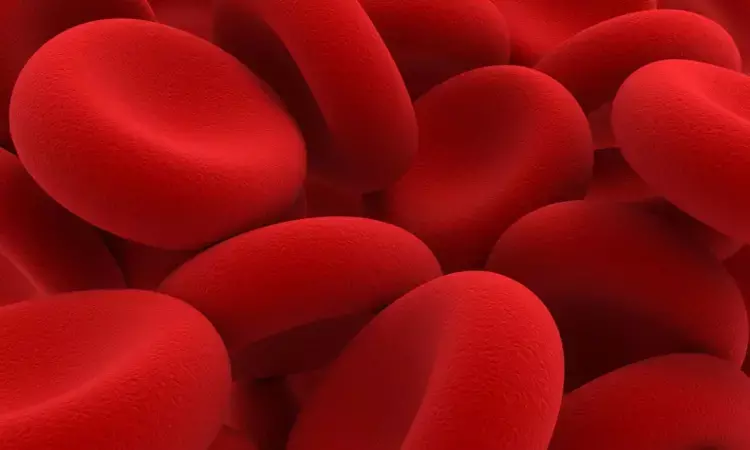- Home
- Medical news & Guidelines
- Anesthesiology
- Cardiology and CTVS
- Critical Care
- Dentistry
- Dermatology
- Diabetes and Endocrinology
- ENT
- Gastroenterology
- Medicine
- Nephrology
- Neurology
- Obstretics-Gynaecology
- Oncology
- Ophthalmology
- Orthopaedics
- Pediatrics-Neonatology
- Psychiatry
- Pulmonology
- Radiology
- Surgery
- Urology
- Laboratory Medicine
- Diet
- Nursing
- Paramedical
- Physiotherapy
- Health news
- Fact Check
- Bone Health Fact Check
- Brain Health Fact Check
- Cancer Related Fact Check
- Child Care Fact Check
- Dental and oral health fact check
- Diabetes and metabolic health fact check
- Diet and Nutrition Fact Check
- Eye and ENT Care Fact Check
- Fitness fact check
- Gut health fact check
- Heart health fact check
- Kidney health fact check
- Medical education fact check
- Men's health fact check
- Respiratory fact check
- Skin and hair care fact check
- Vaccine and Immunization fact check
- Women's health fact check
- AYUSH
- State News
- Andaman and Nicobar Islands
- Andhra Pradesh
- Arunachal Pradesh
- Assam
- Bihar
- Chandigarh
- Chattisgarh
- Dadra and Nagar Haveli
- Daman and Diu
- Delhi
- Goa
- Gujarat
- Haryana
- Himachal Pradesh
- Jammu & Kashmir
- Jharkhand
- Karnataka
- Kerala
- Ladakh
- Lakshadweep
- Madhya Pradesh
- Maharashtra
- Manipur
- Meghalaya
- Mizoram
- Nagaland
- Odisha
- Puducherry
- Punjab
- Rajasthan
- Sikkim
- Tamil Nadu
- Telangana
- Tripura
- Uttar Pradesh
- Uttrakhand
- West Bengal
- Medical Education
- Industry
Iron deficiency anaemia linked with higher HbA1c levels in non-diabetics

Pakistan: A recent study has shed light on the relation of low serum iron and transferrin saturation (TSAT) with elevation in HbA1c value, implying the need for iron deficiency correction before HbA1c interpretation.
"Our study statistically proved the correlation between iron deficiency anaemia and HbA1c levels, thus, diabetes patients should periodically check their iron status too, which can influence their HbA1c parameter used to assess the degree of their glycemic control before," the researchers wrote in their study published in Pakistan Journal of Medical Sciences.
Iron deficiency is the most common type of nutritional deficiency, and is a major health problem prevalent worldwide and has serious negative effects on human health. Previous studies have shown that iron-deficiency anaemia influences HbA1c levels, but the results were contradictory. Therefore to clarify this relationship, Darshan Kumar, Dow University Health Sciences Karachi, Pakistan, and colleagues aimed to determine the correlation of HbA1c with serum iron and transferrin saturation in nondiabetic patients with iron deficiency in a cross-sectional comparative study.
The study was conducted on 230 non-diabetic patients (63.9% were females; the mean age of patients was 43.7±13.28 years) based on fasting blood sugar (FBS) of <100 mg/dl. They were categorized into two groups: Group 1 included patients with iron deficiency anaemia (ID), and Group 2 included the same number of sex and aged-matched healthy subjects taken as controls, without iron deficiency.
A blood sample was obtained for serum iron, HbA1c, CBC, and total iron binding capacity. The calculation was TSAT was done. A comparison was made of quantitative variables with ID and non-ID groups. Correlation of HbA1c with TSAT and iron was done in both groups using the Kendal tau-b test, as data were not normally distributed.
The key findings of the study were:
- The mean HbA1c level was significantly high in the ID group (5.89±0.43) as compared to the non-ID group (5.52±0.50) with a p-value <.001.
- The HbA1c levels correlated negatively with haemoglobin, serum iron levels and transferrin saturation with a p-value <.001.
"Two major findings were observed in our study, first that patients with iron deficiency have higher HbA1c levels versus those who don’t and second that there is a strong correlation of HbA1c levels with serum iron, haemoglobin, and transferrin saturations," the researchers reported.
The limitations of the study were a lack of follow-up and small sample size. The study was performed in non-diabetic patients and it might be possible that the anaemia's effect on HbA1c levels may be greater, which could have significant clinical relevance in patients with diabetes mellitus, the researchers note.
Reference:
Kumar, Darshan, et al. "Correlation of HbA1c With Serum Iron & Transferrin Saturation in Non-Diabetic Patients With Iron Deficiency." Pakistan Journal of Medical Sciences, vol. 39, no. 4, 2023, pp. 956-960.
Dr Kamal Kant Kohli-MBBS, DTCD- a chest specialist with more than 30 years of practice and a flair for writing clinical articles, Dr Kamal Kant Kohli joined Medical Dialogues as a Chief Editor of Medical News. Besides writing articles, as an editor, he proofreads and verifies all the medical content published on Medical Dialogues including those coming from journals, studies,medical conferences,guidelines etc. Email: drkohli@medicaldialogues.in. Contact no. 011-43720751


